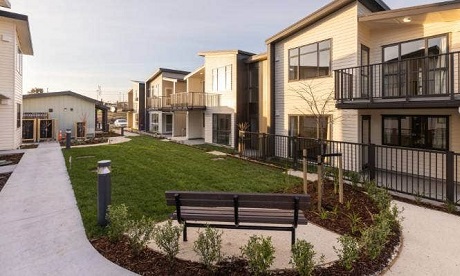The Government’s $350m Affordable Housing Fund is getting a mixed response from housing providers.
It says it will start accepting applications for the Fund from community housing providers this week.
The Fund will provide grants of up to 50 percent of the costs for affordable rental property developments.
Some housing providers are positive. They say after waiting six years for funding to build new homes, the scheme is a good start.
Others aren’t so upbeat.
South Auckland’s Monte Cecilia Housing Trust has some concerns.
Chief executive Bernie Smith says many providers in the Auckland region will struggle to take advantage of the scheme.
“I think in Auckland if you are a community housing provider and you’re sitting on land it’s great,” Smith says.
“But if you don’t already have the property and plans to go, I don’t know how you could make it work.”
Smith notes there are already supply-side shortages in the construction sector. There’s a lack of available tradespeople. Materials are in short supply. These shortages could impact on the timing of projects, he says.
Others reporting on construction costs say they’re rising at the fastest pace on record.
At the same time, Smith points out property prices in the region add to the cost of developments.
Smith says he plans to meet with officials from the Ministry of Housing and Urban Development to discuss his concerns.
Monte Cecilia may have to use the Fund in the future to fund housing if it can make it “stack up”.
A cut to funding last year allowed social housing providers to lease existing private sector properties. That left providers like Monte Cecilia struggling to provide homes for families who need transitional housing.
Minister for Housing Megan Woods has responded to criticism of those funding cuts, pointing to the emphasis on building new homes rather than always buying or leasing accommodation.
Reports say Kāinga Ora has been working on ways to speed up the process of building new homes.
“Project Velocity” has cut the time it takes to get shovels into the ground down from 18 months (on one project) to two months.
Speed is of the essence. Cities – like Rotorua – anticipate needing emergency housing for at least another five years.
Community Housing Aotearoa chief executive Vic Crockford says the Fund is a good start for building affordable rental properties.
“Many households are finding it extremely difficult to pay rent and the impact of that is a swelling transitional housing waitlist and too many of our children in temporary accommodation, unable to put down roots,” she says.
Crockford says many providers in the Fund’s target regions are ready and waiting with projects in the pipeline.
Source
Additional readingNews category: New Zealand.




